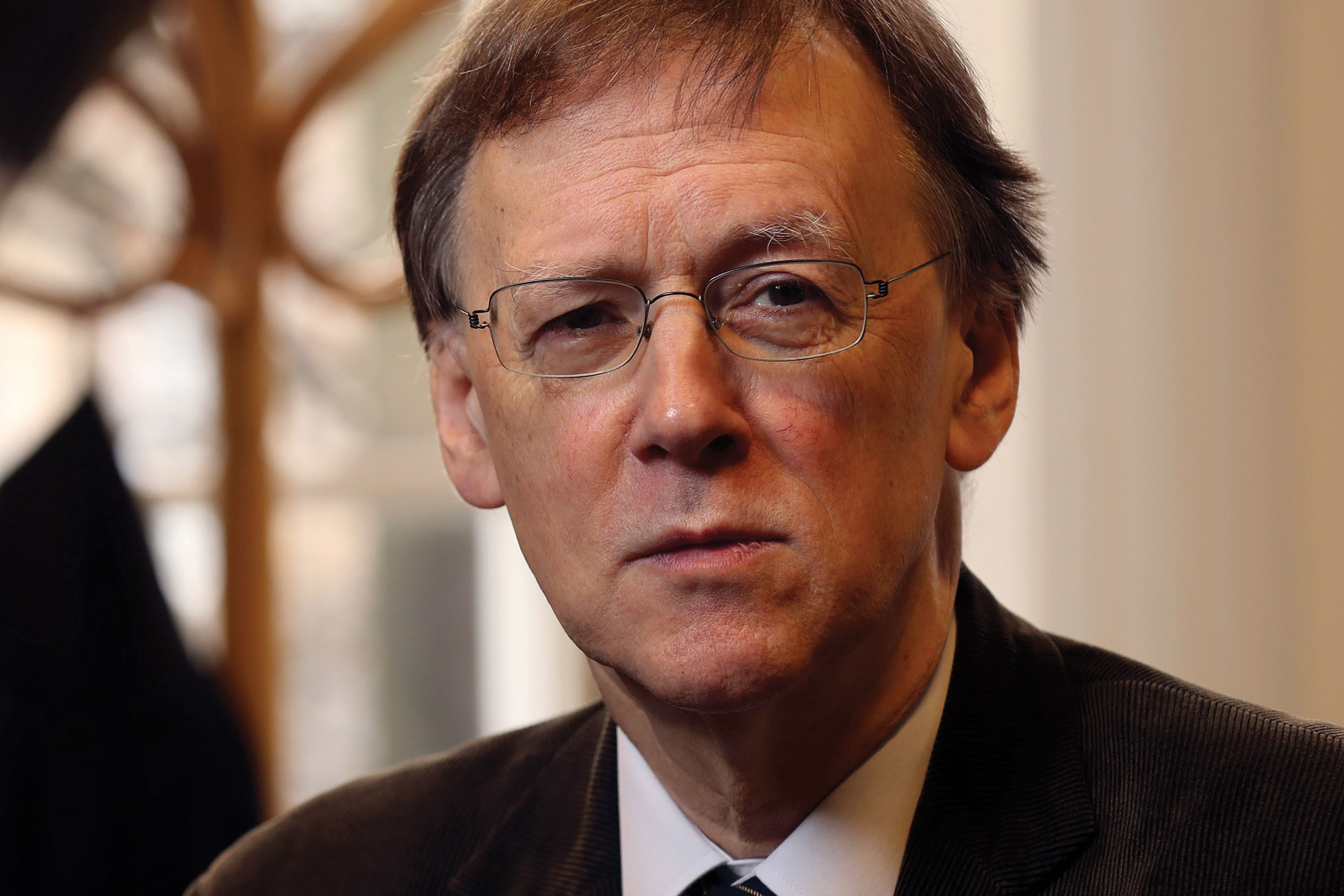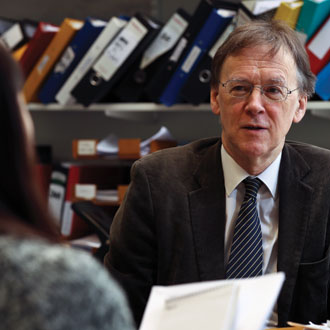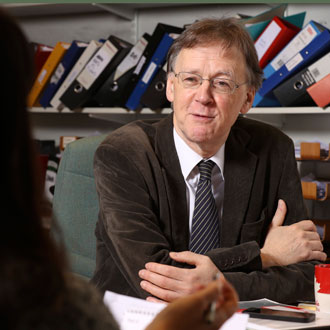‘We’re trying to build the future’


prof graham watt 3×2
Professor Graham Watt is an academic GP with his feet firmly planted on the ground. A former research registrar for legendary GP Dr Julian Tudor Hart, this month he received a lifetime achievement award at the General Practice Awards from Pulse as recognition of the impact his work has had.
Dr Tudor Hart coined the ‘inverse care law’ in an article in 1971 to describe the phenomenon that the availability of good medical care is inversely proportional to the level of need, and Professor Watt has taken on his work to campaign vigorously for greater resources for practices serving the most deprived areas.
He has been leading the ‘GPs at the Deep End’ project since 2009, bringing together the 100 practices in the most deprived areas of Scotland, conducting groundbreaking research and lobbying for change. His success has inspired other Deep End projects in Yorkshire, Ireland and even Australia.
Pulse speaks with Professor Watt at a critical time. Last year, Scottish First Minister Nicola Sturgeon specifically cited the work of Deep End and promised to look at the way deprived practices are funded in the new Scottish GP contract, due to take effect in April 2018.
But details of this remain scant; Professor Watt may be preparing to retire, but the struggle goes on.
Based on your research and your work with GPs at the Deep End, what do you think is the key to improving care for practices in deprived areas?
Probably collegiality. The Deep End is a loose network of colleagues connected by ideas and passion and the opportunity to put things into effect.
I think many of our institutions are past their sell-by date and no longer really fit for purpose. There’s an anti-establishment mood around and there’s an element of that in the Deep End. But I think it’s much more positive in the sense that we’re trying not only to imagine but to build the future, based on more time for patients, continuity, developing the concept of a small team of generalists as the centre of local hubs, connecting everybody so they can learn from and support each other, and actually giving leadership to the system at ground level.
What should politicians be doing? Is it simply about more money?
Ministers have said the resource issue for deprived practices could be dealt with through the GP contract. But that has been questioned, partly because of the lack of suitable data and also because it could destabilise other practices.
The Scottish Government recently announced extra resources for primary care, and that creates an opportunity for the ‘inverse care law’ to be addressed through a policy of differential growth in which nobody loses.
The drive for primary care transformation, which the Scottish Government is very keen on, must not sidestep the inverse care law. Nurses, pharmacists, link workers and admin support are all important additions to the primary care team, but the big need is for medical generalists who can cope with multimorbidity and social complexity.
In terms of the inverse care law, is the situation getting better or worse?

prof graham watt 330x330px
Well, my recent lecture on the inverse care law to the RCGP in Scotland was called ‘The monstrous longevity of the inverse care law’. It has survived a long time but is barely mentioned in reports on health inequalities, reflecting an underestimation of the extent to which GPs in general, but particularly in deprived areas, stem the tide of poor health and its complications.
Good primary care keeps people in the community by lessening their problems and slowing their progression so they don’t proceed to complications and need out of hours, A&E or acute admission.
And is inequality getting worse?
As a result of globalisation and the economy, the gap between the haves and the have-nots is widening – that partly explains recent anti-establishment voting.
You can’t rescue the NHS by trying to go back in time to how things were. Basically the issue is, how are we going to live with an ageing population with multimorbidity that needs personalised continuity of care close to home? I think the only sustainable answer to that is a strong general practice team.
What are the key findings from your research and the Deep End project?
I did a study of 3,000 consultations in the west of Scotland with Professor Stuart Mercer of the school of medicine at University of Glasgow.1 It showed the consequences of the inverse care law for consultations, changing it from an abstract notion of inequality to real implications for patients. It showed patients came in with more problems, there was less time, they were less enabled and the GPs were more stressed. That was important information.
Subsequently there’s been a randomised control trial called Care Plus, which gave extra time for consultations for complex problems.2 That was shown to be a cost-effective use of NHS resources.
There are now about 30 reports on the Deep End, mainly capturing experience and views – I think that has been as powerful as some of the research.
Whenever I’ve given evidence to a committee at the Scottish parliament, I take two Deep End GPs with me because their descriptions of what they’ve done that morning capture MSPs’ attention much more effectively than my research. So I’d say a combination of research and experience has marshalled the argument.

prof graham watt 330x330px 2
What are the main benefits for Deep End practices?
In 2009, these practices had never been convened or consulted by anybody. Seven years on and the Deep End is a well-recognised brand, so we’ve got identity, a voice, profile, some impact and shared activity, and collegiality.
In the first couple of years it was mainly a morale-boosting initiative, because it connected colleagues in the same boat. Recently, though, it has given practices the opportunity to do things.
Practices are getting additional clinical capacity. For example, the Deep End Pioneer Scheme sees young GPs employed for eight sessions a week, three of which are additional capacity for the practice. Two of the sessions are specifically to release time for host GPs to reflect, plan and develop services, and one is for a lead GP to work with all the other GPs. The final two are protected for day release, which goes to address the training needs of Deep End practices.
The practices now don’t feel continually under pressure and actually have space to be more proactive and less reactive.
I think it’s the only government recruitment and retention initiative to be so broadly conceived; not just getting young GPs into practice but giving them opportunities and experiences that make them want to stay.
What impact has Deep End had beyond the practices involved?
We now appear regularly in reports and documents and get asked about consultations, such as social security and the mental health strategy.
And it’s spreading. There’s a Deep End project in Yorkshire and Humber, one in Ireland and the beginnings of one in Australia. The idea also seems to have reached North America. It’s encouraging that the thinking is global.
I was in Dublin recently and one of the GPs was talking about the original Deep End article in the BJGP in 2011.3 She said she had felt like a patient with a rare disease who’d suddenly found a support group because it was speaking her language and describing her situation.
How do you feel about winning the lifetime achievement award?
It’s quite strange. I like the fact it doesn’t strike me as an establishment award because Pulse is accountable in the broad sense to its readers, so it’s a general practice award. In a sense the challenge for an academic GP is to be relevant to service GPs and I think the Deep End is a clear example of how the two can work productively together.
CV
Age
64
Education
- 1976 University of Aberdeen (MBChB, BMedBiol and MD)
Career
Pulse October survey
Take our July 2025 survey to potentially win £1.000 worth of tokens











